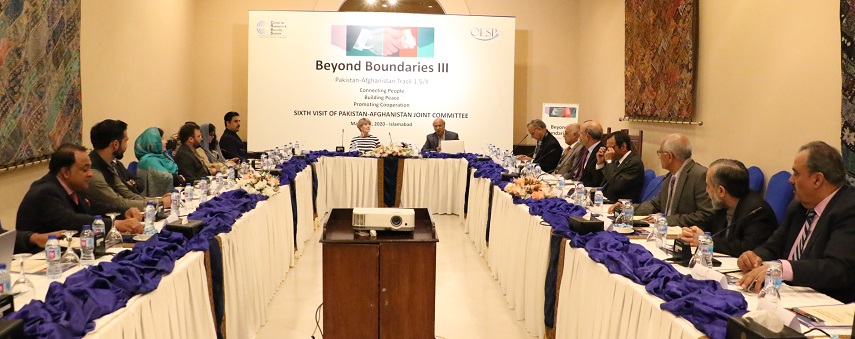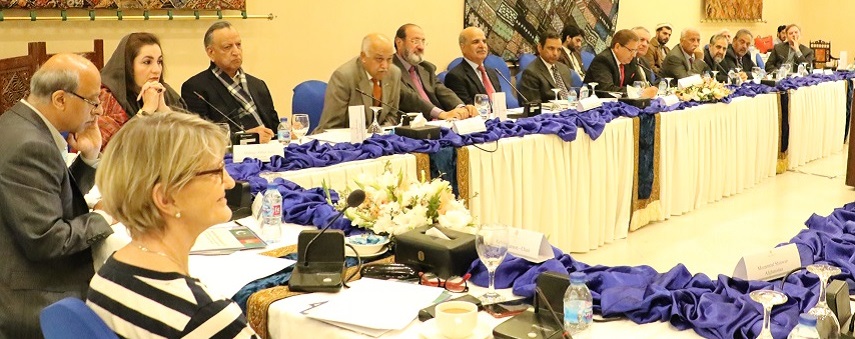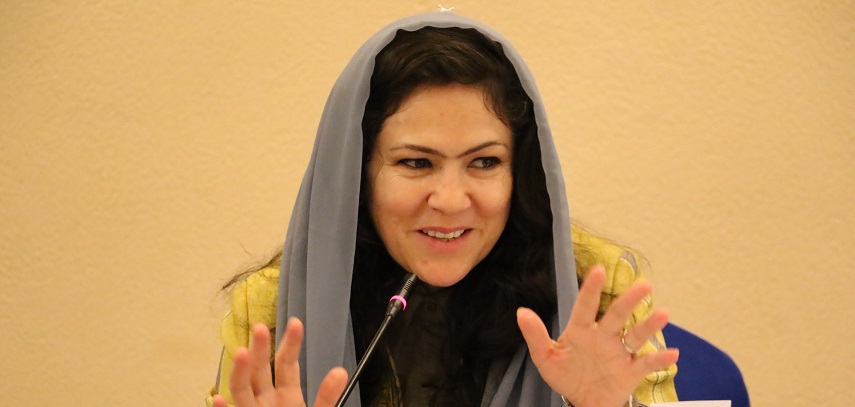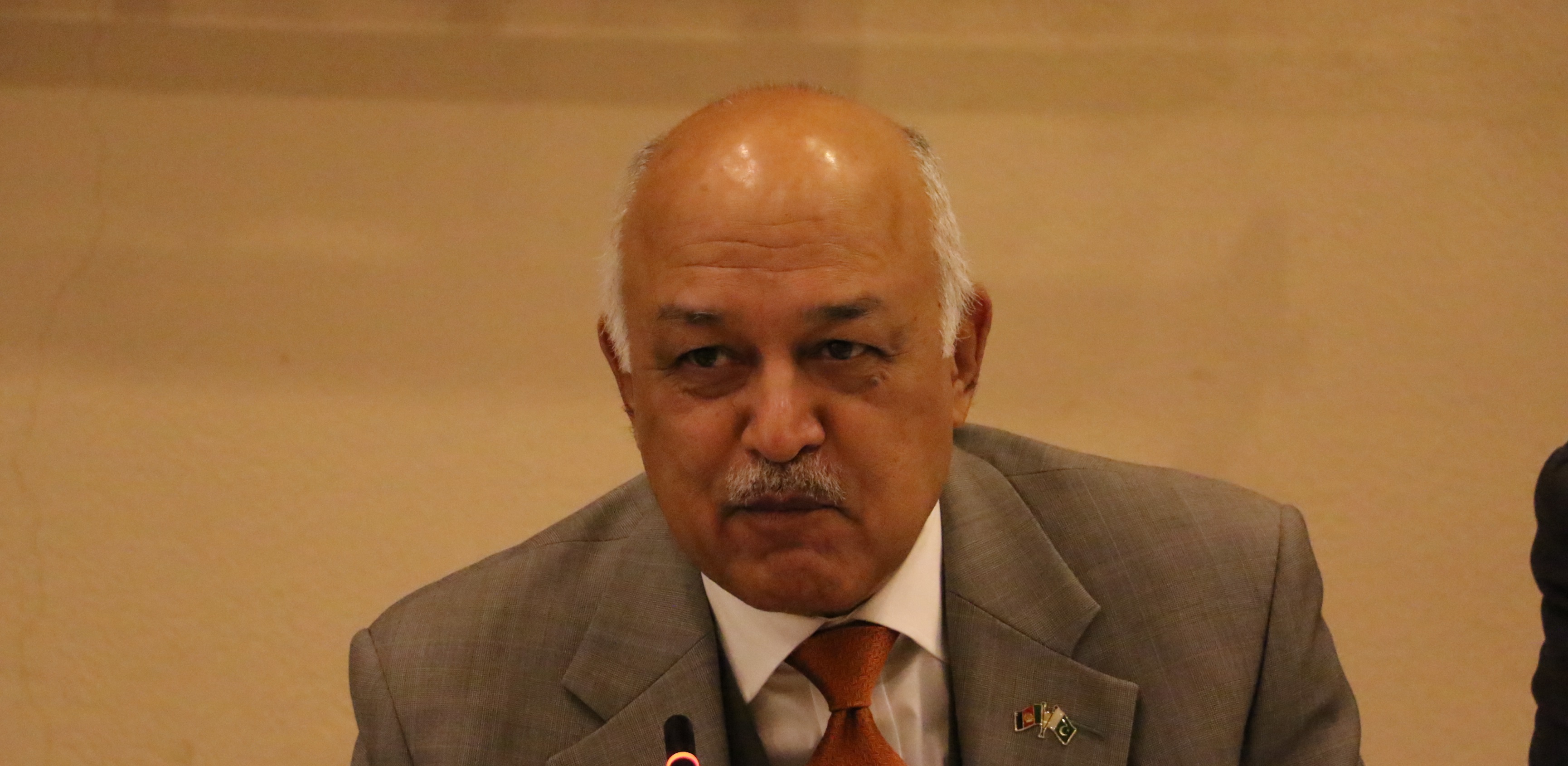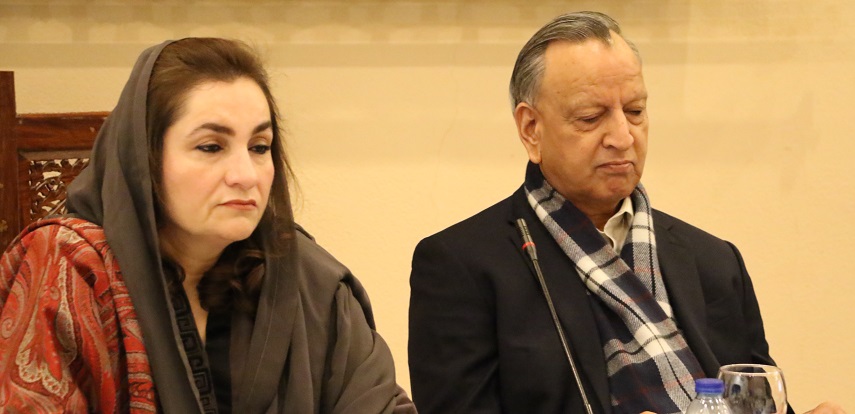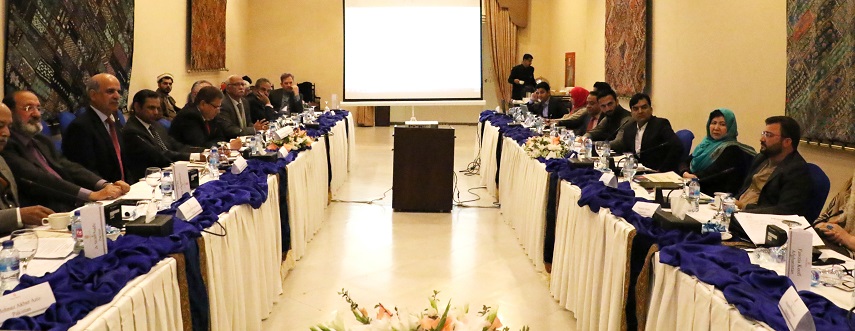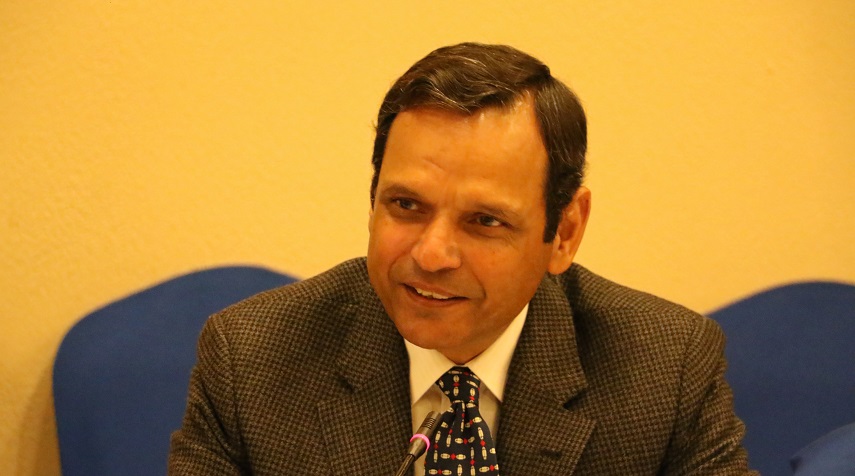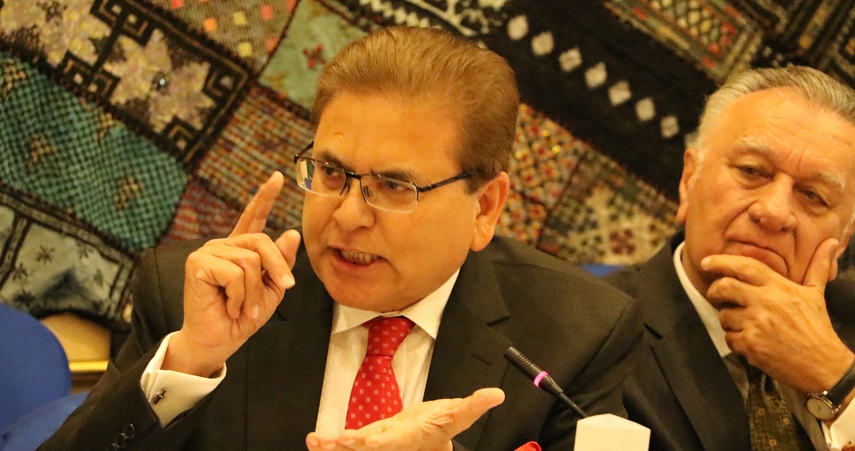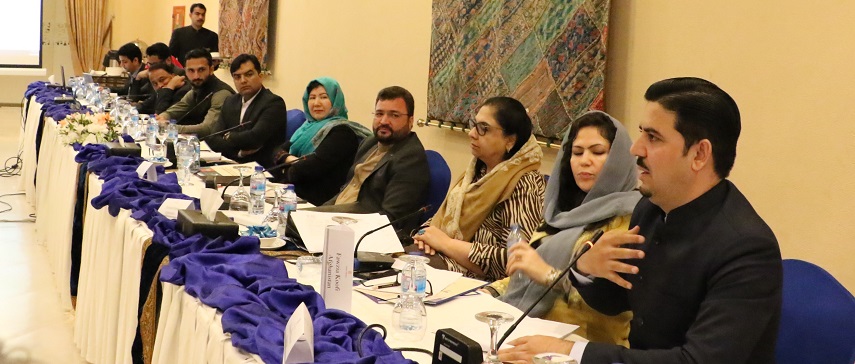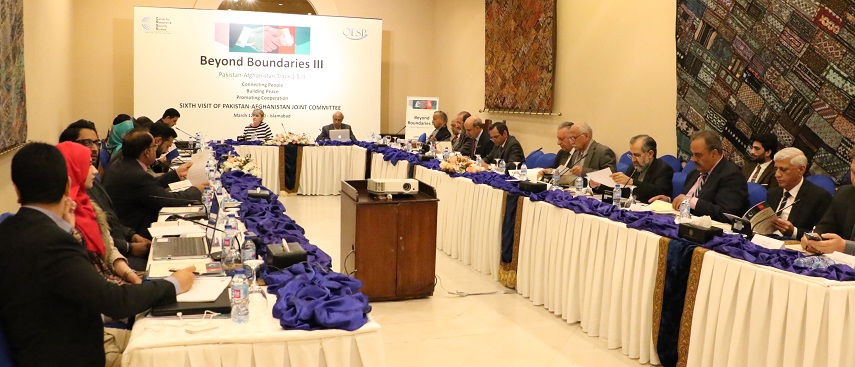The CRSS and its Afghan partner organization OESP’s Pak-Afghan track 1.5/II initiative “Beyond Boundaries” held its sixth meeting of the third phase of the project in Islamabad from 11th to 13th March, 2020. Overall, since October 2015 when this track II initiative started, in total eighteen meeting (in both countries) have been held so far; 12 meetings were held in phases 1 & 2, while this was the 6th meeting in phase 3.
A high level six- member Afghan delegation, headed by former Member of Afghan Parliament and first woman Second Deputy Speaker of Afghan Parliament, Ms. Fawzia Koofi, arrived in Islamabad on Wednesday 11th March for a short two-day visit. The other members of the Afghan delegation included: Mr. Mozammil Shinwari, former Deputy Trade and Commerce Minister; Mr. Saleem Khan Kunduzi, former Governor Nangarhar; Ms. Momina Yari, former Commissioner of the Independent Election Commission of Afghanistan; Ms. Palwasha Hasssan, Civil Society Leader and Member High Peace Council, and Mr. Waris Hasrat, Senior Journalist State Television-ATN.
The Pakistan delegation was headed by Dr. Shoaib Suddle, former IG Police and Federal Tax Ombudsman. The other members included: Ms. Mehnaz Akber Aziz, Member of Parliament; Maj. Gen. (retd) Athar Abbas, former DG ISPR; Lt. Gen. (retd) Asif Yasin Malik, former Defense Secretary; Maj. Gen. (retd) Masood Aslam; former Ambassadors Mr. Muhammad Sadiq, Mr. Ayaz Wazir, Mr. Abrar Hussain, Mr. Asif Durrani, Mr. Qazi Humayun; Ms. Ammara Durrani, development professional and public policy expert; Mr. Haroon Sharif, former BOI Chairman- a well-known global expert of economic policy; Mr. Hasan Khan, Senior Journalist at Khyber TV; and Vice Admiral Khan Hasham Bin Saddique, President IPRI.
On Thursday 12 March, the Pakistan Afghanistan Joint Committee (PAJC) Groups bilateral dialogue was held at Serena Hotel, Islamabad, from 10:00 am to 5:00 pm. The bilateral dialogue comprised four three sessions till 4:00 pm, and last wrap session to formulate Policy Recommendations. The dialogue was structured for discussion around the dynamics of intra-Afghan dialogue, the fears regarding the future of Afghanistan in the wake of possible new set-up post intra-Afghan talks, regional interests attached to Afghan peace process, the future of Afghanistan’s economic viability, Pak-Afghan bilateral relations, people to people contacts, along with other important factors that comes into the equation. Besides the two delegations, the Chair for the PAJC dialogue sessions was Kathy Gannon, Pakistan- Afghanistan Expert, Senior Journalist with Associated Press and author of “I is for Infidel: From Holy War, to Holy Terror, 18 Years Inside Afghanistan,” an examination of the Taliban and post-Taliban period, published in 2005.
The same evening CRSS hosted the visiting Afghan delegation and some members of Pakistan delegation for a working-dinner at Islamabad Club, with some notables including politicians across major political parties, diplomats, civil society and media leaders.
The next day Friday 13th March, the visiting Afghan delegation and some members of Pakistan delegation accompanied by CRSS team held important sideline meetings with senior Pakistan government leaders. The meetings included meeting with the Special Advisor to Prime Minister (SAPM) on National Security Division, Dr. Moeed Yusuf, at PM Secretariat. Meeting with the Leader of the House, Senate of Pakistan, Senator Shibli Faraz, at Parliament House. And, meeting with the Foreign Secretary Ministry of Foreign Affairs (MoFA), Mr. Sohail Mahmood, at MoFA. The delegations briefed the Pakistani leadership on the important discussions held at the PAJC dialogue, and shared the Policy Recommendations with the three government leaders. In the three meetings important, positive and consistent messages resonated from Pakistan leadership: “Reaffirmation of Pakistan’s support for a peaceful, stable, united, democratic, and prosperous Afghanistan. And, reiteration of Pakistan’s steadfast support for Afghan peace process, underscoring commitment to expand fraternal ties with Afghanistan at all levels, particularly at people-to-people level”.
Day One 12th March PAJC bilateral dialogue:
During the first session, the PAJC groups held interactive discussions on: Review of Policy Recommendations from previous PAJC dialogue/meeting held in August, 2019, in Islamabad- Highlighting the recommendations made in the previous dialogue and update on progress against these recommendations. The delegations noted that unfortunately since then there had been no substantial progress as the government to government level meetings were stalled due to political tensions and turmoil in Afghanistan following allegations and controversies after the Afghan Presidential elections held in September 2019, the election fiasco still continues with two rival Presidents swearing-in at the same time.
The second session comprised Interactive discussion on Challenges Ahead; Intra-Afghan Dialogue; Prospects for Forward Movement; How to Guard Against Spoilers; Expectations from Pakistan; Prospects for Continued Pak-Afghan Cooperation; and How Best to Insulate the Bilateral Dialogue from Political Developments?
Chair Ms. Kathy Gannon said that Islamabad has been extending an olive branch to Kabul for long, but Afghans look at it with sheer suspicion. In contrast, often, Afghanistan first asks Pakistan to get involved in the peace process, but the moment Pakistan jumps in, Afghan government gets upset with it. This contradictory approach needs to be decoded. On the other side, Pakistan sees its interest being threatened from the Afghan soil. So, amid all this, people to people contact is of sheer importance and forums like this help in clearing such notions. She also pointed out that Afghan Peace process has implications for Pakistan as well. People-to-People contacts at all levels, trade cooperation and economic connectivity will greatly benefit both countries, she added.
Head of Afghan delegation Ms. Fawzia Koofi acknowledged that due to present crisis internally we are not united in Afghanistan. We need to be united to make the peace process successful and sustainable with all leaders’ and segments of Afghan society’s participation in the intra-Afghan dialogue. She highlighted that the narrative in Afghanistan is still anti-Pakistan. There have been some positive steps by Pakistan to change the narrative to trans-building mechanism, but not too many. Given that we cannot change the geographical location of our countries, we have to be realistic on how we plan. The change of narrative in Afghanistan is thus extremely important. She further said that we understand the role of Pakistan in the peace process is enormously important. We expect Pakistanis to ensure that they stand with Afghanistan today, including the empowerment that women have gained in Afghanistan.
Former Defense Secretary Lt. Gen (retd) Asif Yasin said that there is a perception that if there is a Taliban government, it would be very pro-Pakistan, which is factually not correct. He noted that Afghanistan has come to an era which is irreversible, Taliban or no Taliban. Women rights, education, art, culture, television. Now there should be least fear in the hearts of the Afghan people that a bunch of gun-trotting people cannot take away their rights. Pakistan’s interest is simple; peaceful and stable Afghanistan. What I would suggest for both the countries to have a people-driven movement for friendship with each other as both are democratic countries. The will of politicians stops at the election; but not the peoples. This forum can trigger the movement. It should be a people’s driven agenda, he added.
Pakistan parliamentarian Ms. Mehnaz Akber Aziz appreciated that CRSS has also done events for youth, such as Pak-Afghan youth dialogues, youth leaders’ summits and youth entrepreneurs conference. When the youth studies in Pakistan and they go back, they can change the negative perceptions between the two countries. I would propose that we should work in the areas where we can collaborate. We need to find groups to work together. If Pakistan weren’t there, who would have helped Afghanistan. How strong the women are in Afghanistan; we want women in both countries to work together. Let’s find those footholds, on education, on entrepreneurship, on women. In these dialogues, we need to find out ways and means where both sides can be supportive of each other. Because Afghanistan has a large population of youth who may be left unemployed then and not enter the private sector, and Women too. I really respect Afghan youth and women because they are very resilient.
Afghan delegate Ms. Momina Yari said that why anti-Pakistan perception exists in Afghanistan. Pakistan government has taken good steps on peace talks in Afghanistan, the declaration signed between Taliban and US. We really emphasize that Pakistan has a neutral and supportive position for the peace process of Afghanistan. Now as for Afghanistan, the four decades of war has made the people very tired, from children to women, so this peace process is very important for the people of Afghanistan.
Mr. Saleem Khan Kunduzi, former Governor of Nangarhar, said that while there will be tensions, however, the important thing is how can we reduce that. He further added that the top priority for the entire Afghan nation for now is only peace; but it depends on the success of peace process and intra- Afghan dialogue. Let us keep the fingers crossed, he added. As civil society members, he said, we should all be open to certain ground realities but move forward.
President IPRI Vice Admiral (retd) Khan Hasham Bin Saddique said that outside Afghanistan if there is anyone that wishes for peace for Afghanistan, that’s Pakistan. We want a peaceful and stable Afghanistan. If geography is something to be considered, then we have to be friends. A peaceful, stable and sovereign Afghanistan that supports the regional integration, is in the best interest of Pakistan.
The delegates emphasized that with the signing of US-Taliban peace deal and recent election fiasco in Afghanistan – two rival Presidents swearing-in at the same time – there are fears over the sustainability of the peace deal and concerns over its long-term consequences. This prompts cautious optimism and wary cynicism, in particular considering that the next step – an intra-Afghan dialogue – will be a bumpy road to ride through.
Regarding Pakistan role vis-à-vis peace process, it was discussed and emphasized that it is a key stakeholder in the Afghan peace process. Islamabad should be viewed as a connector rather than a destabilizer. The world is also acknowledging Pakistan’s positive role in bringing Taliban to table talks. Further, the delegates from both sides agreed that Islamabad should continue its facilitation regarding the Afghan peace process till the end, by utilizing whatever influence it has over elements within the Afghan Taliban, without becoming a party to it.
The third session included interactive discussion on: Involving Stakeholders for Cooperation on Health, Education, Trade, People-to-People Relations, Economic Cooperation, Bilateral and Regional Connectivity, and Peace and Security; Bilateral and Transit Trade – Government to government review/amendments for APTTA and PTA (Due by July 2020); and Role of Media on both sides in Improving bilateral relations.
Former DG ISPR, Maj. Gen. (retd) Athar Abbas said that mistrust exists at various levels between the two countries. Unless it is resolved, it will keep going on. He recalled that under former COAS Gen. Kayani both countries signed a military contract regarding fencing, which can rescue political sides. We should go for the formal fencing of the border. It is only for security of both sides, check and control. Because we have also suffered heavily due to unmanned borders. We have over 3000 km with India and only a part is fenced and over here with Afghanistan the entire border was open. He further added: “If there is less chaos and more stability, I’m not talking of peace and prosperity, but if the government is stable in Afghanistan, who will benefit from it, there is no doubt, Pakistan and Afghanistan both would”. Nobody in their right sense would want to create more chaos in the region. Afghanistan is our existential concern. Our main orientation is more towards east than towards west. The leadership needs to have a vision, see the end, look at the bigger picture and the vision should be a peaceful end, he said.
Commenting on the role of the media, senior Journalist and TV anchor, Hassan Khan, said that Afghans are a loving and affectionate people, majority of who hold Pakistan in high regard. However, it is the Afghan media that portrays Pakistan as the enemy and taints perceptions. The media fabricates negative narratives in the minds of the Afghan people, fracturing people to people contacts across the border and affecting the hope for peace in the long run. Therefore, media exchanges and interactions are vital to counter the negative narrative.
Former Ambassador to Afghanistan, Mr. Muhammad Sadiq said that Pakistan has engaged practically everybody in Afghanistan over the period of time. Pakistan needs to continue that policy because that is bringing a lot of dividend. On trade issues, he said: “Pakistan has made a lot of mistakes; trade was always beneficial to Pakistan. Trade with Afghanistan is beneficial to both countries but more beneficial to Pakistan. We need to focus on investment from Afghanistan too. Today’s Afghan traders have learnt a lot of trade in Afghanistan. When they will give tax, it will be good for Pakistan’s economy. We have been very careless about transit trade, we shouldn’t be. Steps should be taken to introduce trade friendly policies. If you go to the ports of Pakistan- even Bin Qasim and Karachi ports, we have so much capacity, there’s so much area that’s not been used”. On education, he said that today so many Afghans study in Pakistan, we should encourage more Afghan public to come to Pakistan.
Lt. Gen. (retd) Asif Yasin said: “CPEC is a very important aspect, Afghanistan can benefit from its extension there and beyond to CARs. Khost is a very important reserve of chromite. China is investing there now and it is free. We can even offer that Afghanistan and China can establish a small zone where Afghan investors can invest and can be on the route to CPEC. The CPEC rules of transit for Afghans are different for transit trade. So, we can make a different regime for Pak-China-Afghan trade.
Former Deputy Minister for Trade Afghanistan, Mr. Mozammil Shinwari said: “Helmand can completely make the route smaller. The terrain on the Chinese side – It will reduce the distance from China to Iran for Afghanistan. Overall, economic regional connectivity is the solution for this region”.
Former BOI Chairman, Mr. Haroon Sharif said “On the economic Policy side, as I’ve been dealing with China and in the economic domain, I would like to suggest a few things. My suggestion will be to put a multilateral pool of money which is a project development facility. Give more control to the private sector. There is a lot of money with gulf countries. As long as these projects are on a manageable size. China is willing to invest in Afghanistan and Pakistan. In a multilateral scene, you can invest money as you have a stake. So why not there’s a multilateral partnership”.
Afghan parliamentarian Ms. Fawzia Koofi said that Pakistan will benefit from regional connectivity. “With China, Afghanistan has very good political relationships. We are hoping that China will listen to Afghanistan’s demand for economic connectivity via Wakhan border”, she added.
Both delegations discussed cooperation on health, education, trade, people-to-people relations, economic cooperation, bilateral and regional connectivity. Emphasizing that economic cooperation on bilateral and regional level, renewal of APTTA and PTA by both governments, and establishing special economic zones bilaterally or multilaterally should be included as key recommendations. The delegates reiterated to urge both governments to increase people-to-people level contacts through establishment of Pakistan-Afghanistan Parliamentary Caucus, establishment of Pakistan-Afghanistan Youth Caucus, encouraging media partnership, Cultural Collaborations and Exchanges, Civil Society and Private Sector Cooperation, Women’s organizations exchange, establishing a Pakistan-Afghanistan Youth Caucus, and Academic Partnerships.
The delegates urged that both governments should adopt a liberalized visa regime to enable and support strong movement of peoples and businesses between both countries for constructive socio-cultural, health and economic purposes.
The fourth and wrap session included discussions on: Way Forward from the deliberations and debate around the focused themes of the dialogue; Formulation of policy recommendations with 2 members each from Pakistan and Afghanistan- the two members from Afghan delegation included Ms. Fawzia Koofi and Ms. Palwasha Hassan, while from Pakistan delegation former Ambassador Sadiq and Ms. Ammara Durrani participated.
The two groups presented the policy recommendations to the Chair, who read them out to both the delegations. The session ended with the approval and finalization of policy recommendations in consultation with all the PAJC members (The Joint Declaration of Policy recommendations are appended in a separate tab). The jointly drafted policy recommendations will be shared with both the governments and other relevant stakeholders through the PAJC groups, for improving Pak-Afghan bilateral ties.
Day Two 13th March Sideline Meetings with Pakistan Government Leaders:
The visiting high-level Afghan delegation and some members of Pakistan delegation accompanied by CRSS team held important sideline meetings with senior Pakistan government leaders. These included Meeting with the Special Advisor to Prime Minister (SAPM) on National Security Division, Dr. Moeed Yusuf, at PM Secretariat. Meeting with the Leader of the House, Senate of Pakistan, Senator Shibli Faraz, at Parliament House. And, Meeting with the Foreign Secretary Ministry of Foreign Affairs (MoFA), Mr. Sohail Mahmood, at MoFA (The reports on the three sideline meetings are appended in a separate tab).
The visit concluded with the departure of the Afghan delegation on late afternoon of Friday 13th March for Kabul.
The Joint Declaration of Policy Recommendations, Reports from Sideline Meetings, Media Coverage, Video Interviews of PAJC Members, Social Media- Tweets by MoFA Spokesperson & SAPM Dr. Moeed Yusuf, and Pictures are appended in separate tabs.

